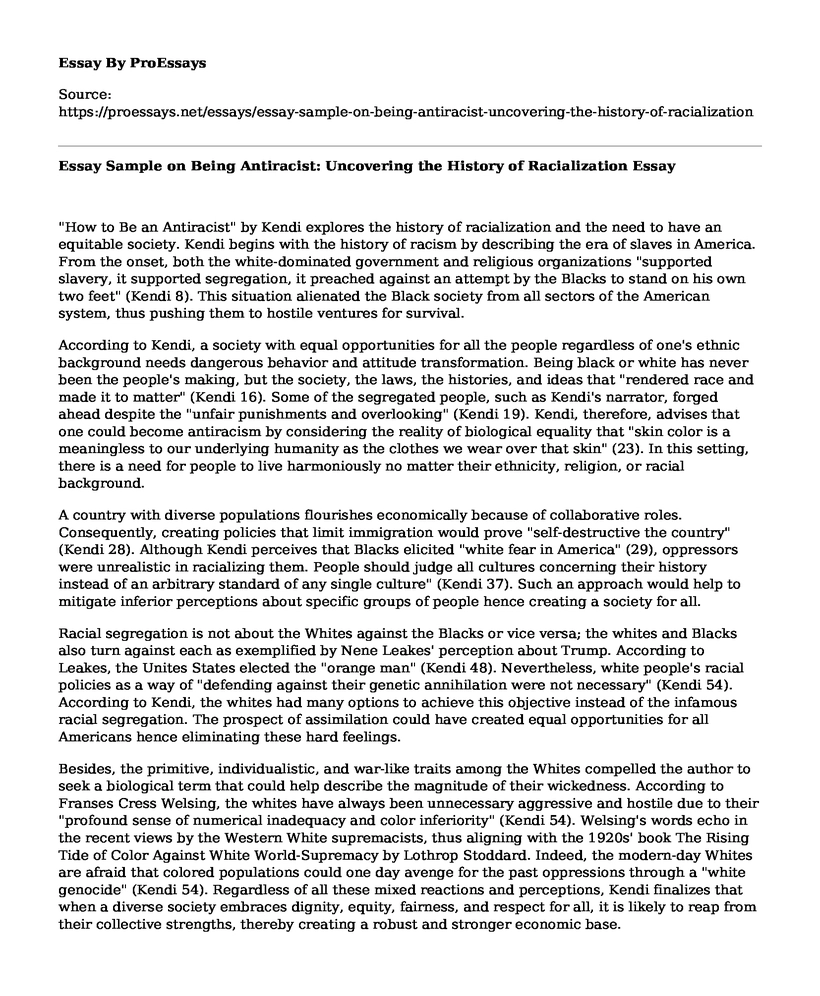"How to Be an Antiracist" by Kendi explores the history of racialization and the need to have an equitable society. Kendi begins with the history of racism by describing the era of slaves in America. From the onset, both the white-dominated government and religious organizations "supported slavery, it supported segregation, it preached against an attempt by the Blacks to stand on his own two feet" (Kendi 8). This situation alienated the Black society from all sectors of the American system, thus pushing them to hostile ventures for survival.
According to Kendi, a society with equal opportunities for all the people regardless of one's ethnic background needs dangerous behavior and attitude transformation. Being black or white has never been the people's making, but the society, the laws, the histories, and ideas that "rendered race and made it to matter" (Kendi 16). Some of the segregated people, such as Kendi's narrator, forged ahead despite the "unfair punishments and overlooking" (Kendi 19). Kendi, therefore, advises that one could become antiracism by considering the reality of biological equality that "skin color is a meaningless to our underlying humanity as the clothes we wear over that skin" (23). In this setting, there is a need for people to live harmoniously no matter their ethnicity, religion, or racial background.
A country with diverse populations flourishes economically because of collaborative roles. Consequently, creating policies that limit immigration would prove "self-destructive the country" (Kendi 28). Although Kendi perceives that Blacks elicited "white fear in America" (29), oppressors were unrealistic in racializing them. People should judge all cultures concerning their history instead of an arbitrary standard of any single culture" (Kendi 37). Such an approach would help to mitigate inferior perceptions about specific groups of people hence creating a society for all.
Racial segregation is not about the Whites against the Blacks or vice versa; the whites and Blacks also turn against each as exemplified by Nene Leakes' perception about Trump. According to Leakes, the Unites States elected the "orange man" (Kendi 48). Nevertheless, white people's racial policies as a way of "defending against their genetic annihilation were not necessary" (Kendi 54). According to Kendi, the whites had many options to achieve this objective instead of the infamous racial segregation. The prospect of assimilation could have created equal opportunities for all Americans hence eliminating these hard feelings.
Besides, the primitive, individualistic, and war-like traits among the Whites compelled the author to seek a biological term that could help describe the magnitude of their wickedness. According to Franses Cress Welsing, the whites have always been unnecessary aggressive and hostile due to their "profound sense of numerical inadequacy and color inferiority" (Kendi 54). Welsing's words echo in the recent views by the Western White supremacists, thus aligning with the 1920s' book The Rising Tide of Color Against White World-Supremacy by Lothrop Stoddard. Indeed, the modern-day Whites are afraid that colored populations could one day avenge for the past oppressions through a "white genocide" (Kendi 54). Regardless of all these mixed reactions and perceptions, Kendi finalizes that when a diverse society embraces dignity, equity, fairness, and respect for all, it is likely to reap from their collective strengths, thereby creating a robust and stronger economic base.
Works Cited
Kendi X. Ibrahim. How to be ab Antiracist. History, Science & Current Affairs Publication Information. New York Times, August 2019. https://www.bookbrowser.com/bb-brifs/details/index.cfm/ezine/preview-number/24368/how-to-be-an-ant-racist.html.
Cite this page
Essay Sample on Being Antiracist: Uncovering the History of Racialization. (2023, Mar 04). Retrieved from https://proessays.net/essays/essay-sample-on-being-antiracist-uncovering-the-history-of-racialization
If you are the original author of this essay and no longer wish to have it published on the ProEssays website, please click below to request its removal:
- Justice in Disguise - Essay Sample
- Gender Discrimination in the Australian Workplace Essay
- 2 Dollars a Day: Poverty in America Paper Example
- Critical Essay: Eva Derzic's Perspective on Communication
- Research Paper on Online Human Trafficking: Exploitation Enabled By Internet Platforms
- Research Paper Example on Photography: A Powerful Tool for Communicating the Truth
- Free Report on INTJ Personality Type: My Jung Test Results







